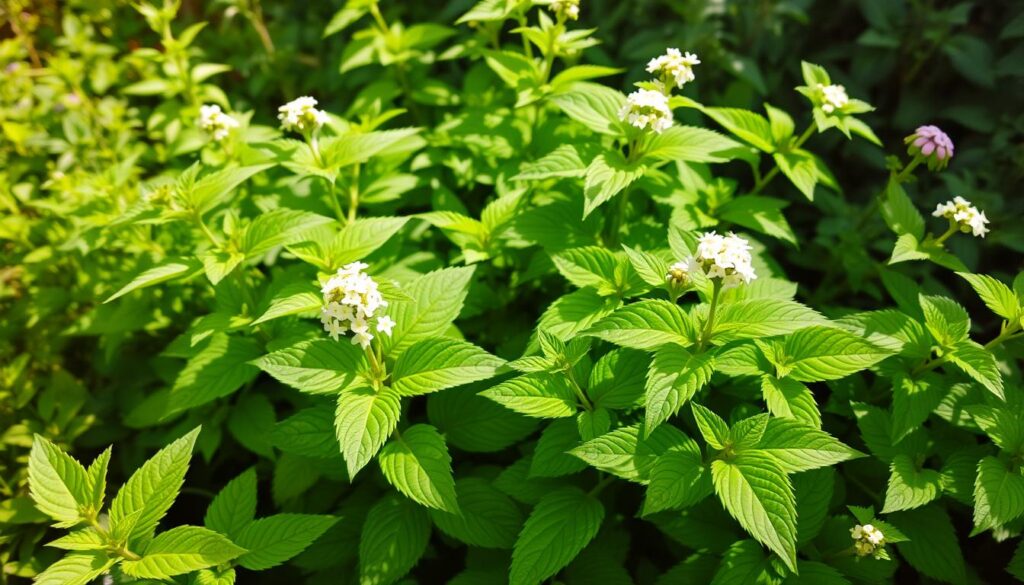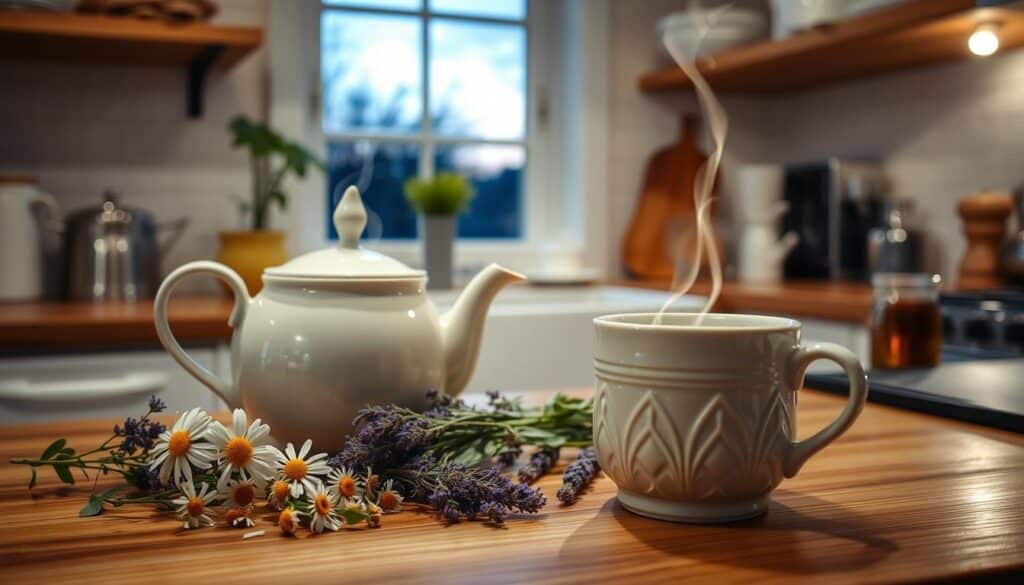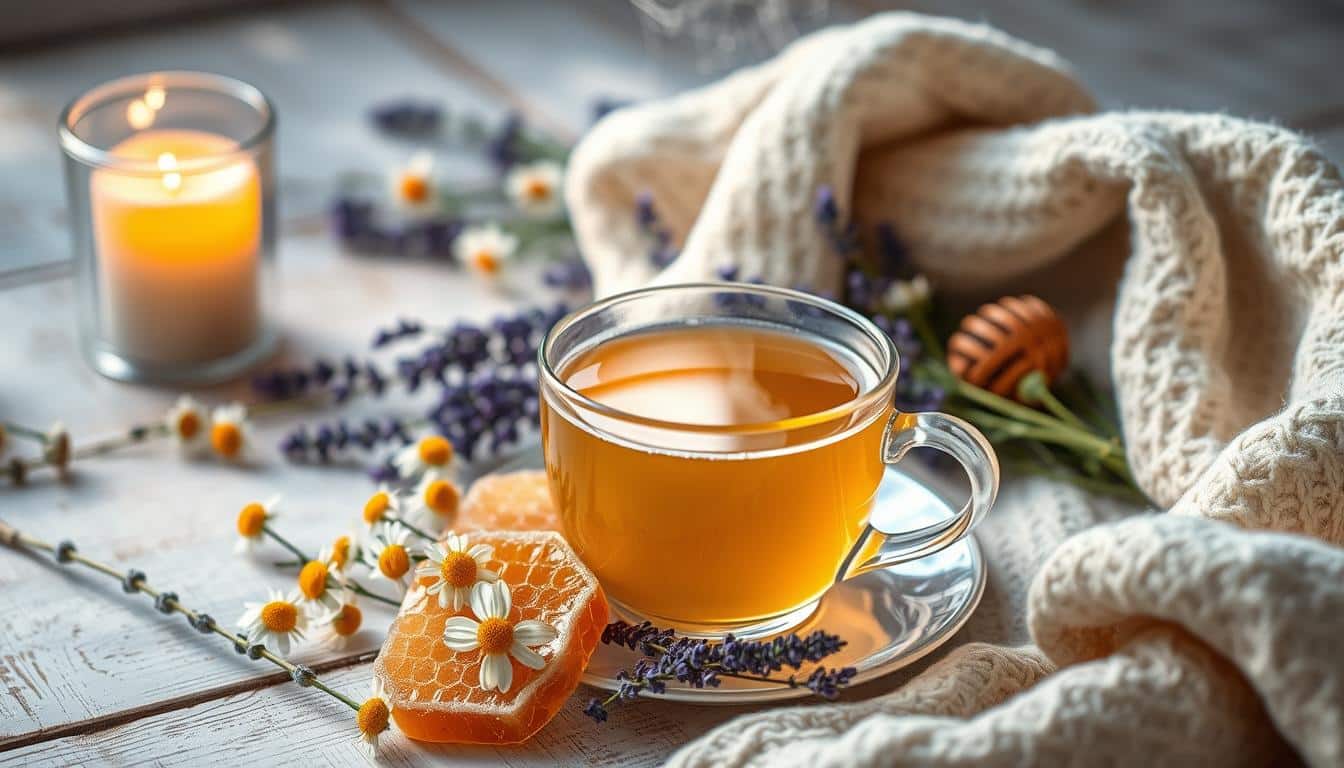As the sun sets, the day’s noise fades away. You grab a warm cup of sleepytime tea, a special part of your evening. The scent fills the room, easing your body’s stress. With each sip, you find calm, letting go of the day’s worries.
Sleepytime tea is more than a cozy drink; it’s a natural sleep aid. It mixes herbs that calm and soothe, helping you sleep deeply. It’s great for those who can’t sleep or want a peaceful bedtime. The effects of sleepytime tea are amazing.
Key Takeaways
- Sleepytime tea is a natural remedy that can help you achieve better sleep quality.
- The combination of calming herbs, such as chamomile, valerian root, and lemon balm, work together to promote relaxation and reduce anxiety.
- Incorporating sleepytime tea into your bedtime routine can help establish a peaceful, sleep-inducing ritual.
- Proper brewing techniques and dosage guidelines are important for maximizing the benefits of sleepytime tea.
- Sleepytime tea may offer additional health benefits beyond just improved sleep, such as reduced inflammation and better stress management.
Understanding the Science Behind Herbal Sleep Teas
Herbal teas can help you sleep better. They work by interacting with the brain’s GABA receptors. This interaction promotes relaxation and helps you fall asleep.
How Sleep-Inducing Compounds Work
Herbs like chamomile have compounds called flavonoids. These compounds, such as apigenin, bind to benzodiazepine receptors in the brain. This triggers a calming effect that makes it easier to fall asleep.
Natural Sedative Properties in Herbs
Herbs like valerian root have natural sedative properties. They contain compounds like valepotriates and sesquiterpenes. These compounds help reduce anxiety and improve sleep quality.
The Role of Flavonoids in Sleep
Flavonoids in herbal teas are important for sleep. They can bind to the brain’s GABA receptors. This action induces a calming effect that promotes sleep.
| Herb | Sleep-Enhancing Compound | Mechanism of Action |
|---|---|---|
| Chamomile | Apigenin | Binds to benzodiazepine receptors, inducing a mild tranquilizing effect |
| Valerian Root | Valepotriates, Sesquiterpenes | Acts as a natural sedative, reducing anxiety and improving sleep quality |
| Lemon Balm | Rosmarinic Acid | Reduces anxiety and stress, which can interfere with sleep |
Understanding the science behind herbal teas helps us see their natural benefits. They offer powerful ways to get a good night’s sleep.
The Most Effective Herbs in Sleepytime Tea
Looking for the best sleepytime tea? Some herbs are key for a good night’s sleep. Chamomile, valerian root, lemon balm, lavender, and passionflower are top choices for sleep teas.
Chamomile is famous for helping you sleep. It has a compound called apigenin that fights insomnia. A study showed new moms who drank chamomile tea slept better and felt less depressed.
Valerian root is a classic for insomnia and anxiety. It helps you fall asleep quicker and sleep better. A study found it and passionflower improves sleep quality.
Lemon balm lowers anxiety and boosts mood. This can help you sleep better. It’s great with other sleep herbs in your tea.
Lavender calms you down by lowering cortisol, the stress hormone. This leads to better sleep and relaxation.
Passionflower is as good as sleep meds for short-term insomnia. It’s a key herb in sleep teas.
Adding these herbs to your tea can improve your sleep and mood. You’ll feel more relaxed and refreshed.
“Sleepytime tea with chamomile, valerian root, and lavender has been a game-changer for my sleep struggles. It’s a natural and effective way to unwind and get the restful sleep I need.”
Benefits of Chamomile as a Natural Sleep Aid
If you’re looking for a natural way to sleep better, try chamomile tea. This ancient tea is known for helping you relax and sleep well. It contains a special compound called apigenin.
Apigenin: The Key Sleep-Promoting Compound
Chamomile tea has apigenin, a flavonoid that relaxes your brain. It makes you feel sleepy. Research shows it can also lower anxiety and help you fall asleep faster.
Impact on Sleep Quality and Duration
Drinking chamomile tea can make your sleep better and longer. A 2016 study found it helped new moms feel less tired and less depressed. Both can hurt your sleep.
Additional Health Benefits
- Reduces inflammation, lowering the risk of chronic health issues
- Supports heart health by potentially lowering blood pressure and cholesterol levels
- Exhibits antibacterial, antiviral, and antimicrobial properties, strengthening the immune system
- Soothes the stomach lining and prevents gas
- May help alleviate menstrual cramps and anxiety related to period pain
- Potentially slows age-related bone loss
- Provides anti-inflammatory benefits for various skin conditions
Whether you have trouble sleeping sometimes or want to feel better overall, chamomile tea might help. Adding it to your bedtime routine could be a natural and effective way to improve your sleep and health.
Exploring Valerian Root’s Sleep-Enhancing Properties
Looking for a natural way to sleep better? Valerian root might be what you need. It’s been used for centuries to help people relax and sleep well.
Valerian root has compounds like valepotriates and sesquiterpenes. These act as natural sedatives. Research shows valerian root extract can help you sleep without the usual side effects. Almost 90% of people in one study said they slept better after drinking valerian tea.
Another study found valerian extract helped people fall asleep quicker. It also made their sleep quality better. This makes valerian root a great natural sleep aid for those with insomnia relief.
“Valerian root has been shown to be a safe and effective treatment to enhance sleep and prevent associated disorders,” according to a 2020 review encompassing 60 studies.
Want to sleep faster or better? Adding valerian root to your routine could change your life. Always talk to your doctor before trying it, especially if you have health issues or take medicines.
Using valerian root’s natural sleep-enhancing properties can lead to better sleep. It’s a step towards more restful nights and better health.
Lemon Balm: A Powerful Addition to Sleep Blends
Lemon balm, or Melissa officinalis, is a versatile herb great for sleepytime tea blends. It’s known for reducing anxiety and stress. This makes it a natural way to improve sleep quality.
Effects on Anxiety and Stress Reduction
Studies show lemon balm calms the nervous system. It works by adjusting neurotransmitters like GABA. This helps ease anxiety and stress, common sleep disruptors.
The research found that 500 milligrams of lemon balm can boost the quality of life scores. It even outperforms some antidepressants.
Combining with Other Sleep-Promoting Herbs
- The lemon balm goes well with sleep-enhancing herbs like lavender, peppermint, and valerian root.
- Together, these herbs work better, offering a more effective sleep solution.
- Lavender’s soothing effects pair well with lemon balm’s stress relief. This creates a strong blend for easy sleep.
Adding lemon balm to your nightly tea can lead to better sleep and less stress. Discover the benefits of this versatile herb for a more restful night.

The Perfect Timing for Drinking Sleepytime Tea
Creating a calming bedtime routine and focusing on sleep hygiene are crucial for a good night’s sleep. Drinking sleepytime tea at the right time is a big part of this. It’s best to have it 30 to 60 minutes before you go to bed.
This timing lets your body soak up the sleep helpers in the tea. Herbs like chamomile, valerian root, and passionflower are in these teas. They help you sleep better and longer.
Stay away from teas with caffeine close to bedtime. They can keep you awake. Instead, choose teas like chamomile, lavender, or magnolia for a calm night.
“Drinking sleepytime tea as part of a consistent bedtime routine can signal to your body that it’s time to wind down and prepare for a restful night’s sleep.”
Adding sleepytime tea to your bedtime routine makes it a cozy habit. It also helps your sleep quality. The tea’s calming effects and the ritual together help you sleep better.
Find the best time for your sleepytime tea that fits your relaxation ritual and bedtime routine. Try different times to see what works best for you.
How to Brew the Perfect Cup of Sleep-Inducing Tea
Making the perfect cup of sleepytime tea is key to its natural sleep benefits. Choosing the right brewing methods and following dosage advice are crucial. Each step is important for getting the most from your herbal tea.
Optimal Steeping Times and Temperatures
To get the best results, steep chamomile tea with 1 tablespoon of dried flowers (or 2 tablespoons of fresh) in 8 ounces of just below boiling point water (around 200°F) for 5-10 minutes. This lets the active compounds like apigenin infuse well, boosting its sleep benefits.
For valerian root and other sleep herbs, steeping times can range from 5 to 15 minutes. Always use water just shy of a full boil for most herbal teas. This helps keep their flavors and active compounds intact.
Recommended Dosage Guidelines
The usual advice is to have one cup of sleepytime tea before bed. But, it’s wise to talk to a healthcare professional for advice tailored to you. This is because everyone’s needs and sensitivities are different.
The secret to brewing the perfect cup of sleep-inducing tea is finding the right balance. Pay attention to steeping time, water temperature, and dosage. By doing this, you can fully enjoy your herbal tea and sleep better.

Potential Side Effects and Precautions
Herbal teas like Sleepytime tea are usually safe. But, it’s key to know about possible side effects and precautions. Some people might have allergic reactions to herbs like chamomile. This can happen if you’re allergic to plants in the daisy family.
Valerian root might cause mild side effects like headaches or an upset stomach in some. These effects are not common but can happen.
Pregnant women, nursing mothers, and those on medications should talk to a doctor before drinking sleep teas. Some herbs can interact with medications or be bad for certain health issues. For instance, chamomile tea might affect blood thinners. St. John’s Wort can cause serotonin syndrome when mixed with antidepressants.
| Herb | Potential Side Effects | Precautions |
|---|---|---|
| Chamomile | Allergic reactions in those allergic to plants in the daisy family | Interaction with blood thinners |
| Valerian Root | Mild headaches, upset stomach | None known |
| St. John’s Wort | None known | May interact with antidepressants, causing serotonin syndrome |
| Lemon Balm | None known | None known |
Start with small amounts of herbal tea and watch how your body reacts. If you notice any bad effects, stop using it and see a doctor. Following herbal tea safety guidelines helps you enjoy these natural sleep helpers without allergic reactions or drug interactions.
Incorporating Sleepytime Tea into Your Bedtime Routine
Creating a bedtime routine is key to better sleep hygiene. Adding sleepytime tea to your routine can make it more effective. It helps your body get ready for sleep.
Begin by making your room calm. Turn down the lights and avoid screens. Try reading, stretching, or meditation. Drinking sleepytime tea can be a cozy part of this bedtime ritual.
The tea’s herbs and sedatives can relax you. This helps you fall asleep more easily.
Being consistent with your bedtime routine is important. Drink your sleepytime tea at the same time every night. This helps your body know when it’s time to sleep.
“A consistent bedtime routine is essential for achieving quality sleep. Incorporating sleepytime tea can be a soothing and effective way to transition into a restful state.”
Everyone’s sleep needs are different. Try out various relaxation techniques to find what works for you. Making sleepytime tea a regular part of your routine can greatly improve your sleep. You’ll wake up feeling refreshed and ready to go.
Creating Your Sleep Tea Blends at Home
Making your sleep tea blends is a great way to get the sleep you need. You can mix herbs to make a tea that helps you relax and sleep well.
Essential Ingredients and Proportions
Begin with chamomile, known for its calming effects. Add valerian root and lemon balm in smaller amounts. A good mix is 1 part chamomile to 1/2 part of each of the other herbs.
- Chamomile: Helps reduce anxiety and promote relaxation.
- Valerian Root: Known for its natural sedative effects.
- Lemon Balm: Reduces stress and anxiety, aiding in better sleep.
Adding herbs like lavender, passionflower, and fennel can make your tea even better. Try different mixes to find the best flavor and sleep benefits.
Storage and Shelf Life Tips
Keeping your tea blends fresh is important. Store them in airtight containers, away from light and moisture. This keeps the oils and compounds that help you sleep.
With proper storage, your tea blends stay good for 6 to 12 months. Always label the containers with what’s inside and when you made it.
Making your own sleep tea lets you choose the best ingredients. You can try different mixes and enjoy a special bedtime ritual.
Conclusion
Sleepytime teas are a natural way to improve your sleep quality and sleep duration. They work by using herbal blends that help you relax. By adding them to your bedtime routine, you can sleep better without using medicines.
It’s good to know that these teas are usually safe. But, if you have health issues or take medicines, talk to a doctor first. They can help you avoid any side effects.
Herbal teas like chamomile, valerian root, and lemon balm help you sleep better. They also reduce stress and anxiety. Brands like Pukka, Yogi Tea, and Celestial Seasonings have many sleep-improving tea blends to choose from.
Using the right sleepytime tea can help you sleep better. Try different teas and see how your body reacts. Adjust as needed to find the best herbal remedies for you. Taking care of your sleep can make you feel better overall.
FAQ
What is sleepytime tea and how can it help with better sleep?
Sleepytime tea is a natural way to improve sleep. It combines herbs with calming effects. This can lead to better sleep quality and less anxiety.
How do the compounds in herbal sleep teas promote relaxation and sleep?
Herbal sleep teas have compounds that relax the brain. Flavonoids, like apigenin in chamomile, work on the brain’s receptors. This helps you relax and sleep better.
What are the most effective herbs for sleep-inducing teas?
The best herbs for sleep teas are chamomile, valerian root, lemon balm, lavender, and passionflower. They help reduce anxiety and improve sleep quality.
How does chamomile tea help with sleep and depression?
Chamomile tea has apigenin, which relaxes the brain. It can reduce nighttime wakings and help with mild depression.
What are the benefits of using valerian root for sleep?
Valerian root has natural sedatives that improve sleep. Studies show it can enhance sleep without the side effects of traditional sleep aids.
How can lemon balm help with insomnia, anxiety, and depression?
Lemon balm modulates neurotransmitters in the nervous system. It can reduce symptoms of insomnia, anxiety, and depression. Studies show it can improve quality of life scores.
When is the optimal time to drink sleepytime tea?
Drink sleepytime tea 30-60 minutes before bed. This lets your body absorb the sleep-inducing compounds and relax.
How should I properly brew a cup of sleepytime tea?
For chamomile tea, use 1 tablespoon of dried flowers in 8 ounces of boiling water for 5-10 minutes. For valerian root and other herbs, steeping times may vary. Use water just below the boiling point.
Are there any potential side effects or precautions to consider with sleepytime tea?
Sleepytime tea is generally safe but can cause allergic reactions in some. Chamomile may cause reactions in those allergic to daisy family plants. Valerian root can cause headaches or upset stomachs. Pregnant women, nursing mothers, and those taking medications should consult a healthcare provider before regularly consuming sleep teas.
How can I incorporate sleepytime tea into my bedtime routine for better results?
Add sleepytime tea to your bedtime routine for better sleep. Pair it with reading, stretching, or meditation. Create a calm environment by dimming lights and avoiding screens. Consistency is key – drink your tea at the same time each night.
Recent Blog Posts :

